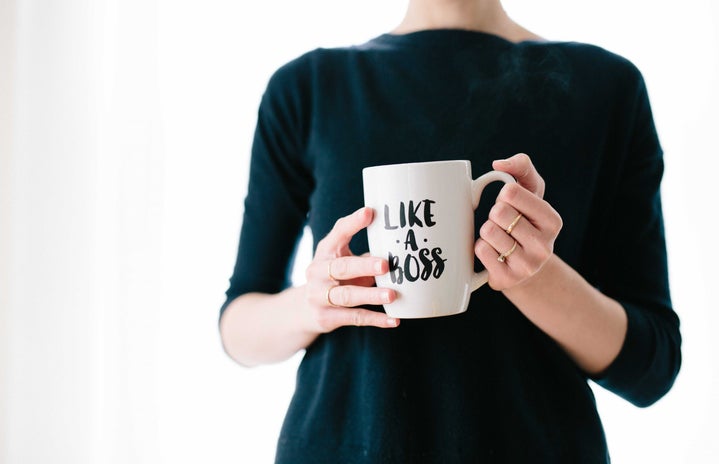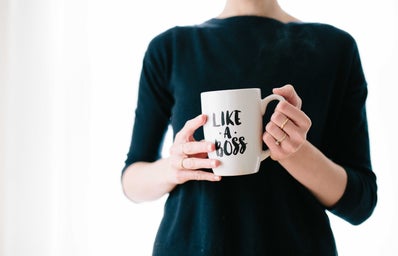Meet Amani Al-Khatahtbeh: the millennial mastermind behind MuslimGirl.com, founder of Muslim Women’s Day, and one of the most influential Muslim Americans (totally casual). As a badass trailblazer in the digital media industry, Amani created an entire online space at the age of 17 for women just like her to communicate, collaborate, celebrate and support each other. Today, MuslimGirl is a booming hub for the modern day Muslim woman, from original reporting on key news and policy to dope makeup and style tips for Eid.
In celebration of Muslim Women’s Day, we chatted with Amani to ask her how she started an entirely new narrative in the media industry, the importance of sisterhood and allyship, and her advice to 20-something Muslim women in the digital media space. Get to know Amani and her incredible journey:
Her Campus: How did you get interested or involved in the digital media industry?
Amani Al-Khatahtbeh: I think that I noticed from a very early age that the media was impacting, if not defining, my whole life and existence. It always felt like people were talking about me but people who looked like me were never doing the talking. The media was impacting people’s perception of myself and my family.
It wasn’t until I visited the Middle East when I was 13 that I became aware of the huge contrast between the way that Western media was representing us versus the actual reality of it. Once my eyes were opened to that, I felt a responsibility to use the resources I had around me as an American woman to change that narrative.

HC: What were the biggest challenges you faced in founding and leading your own company?
AA: I feel like MuslimGirl is the most obvious byproduct of the millennial era. It’s literally the result of a young millennial girl being pissed off by the lack of space for her voice, then going online to let that out. That’s how MuslimGirl organically happened. Lack of resources has always been our biggest obstacle, but very early on, we got past this by using the technology at our fingertips. Using social media and our phones was how we were able to get our voices out there from the get-go.
Another challenge was the lack of space for narratives like ours. When we first started, there weren’t many spaces online for Muslim women of our generation — no conversation for the modern woman with a modern lifestyle who also took into account her culture and practices as a Muslim. For us to break through into this space meant paving a new path. Obviously, this freaked people out — we received some commentary from right-wing parties and more conservative members of the Muslim community.
But at the end of the day, it comes down to shaking people’s beliefs of how Muslim women should look and sound.
HC: What has been the most surreal moment of your career thus far?
AA: The surreal moments keep one-upping themselves as time goes on. Most recently, the first time Representative Ilhan Omar had made any statement on the Boycott, Divestment and Sanctions movement was during an interview on MuslimGirl.com. Her comments were then picked up with countless mainstream outlets and it completely took off. Since we have this platform that’s on our own terms, I can only hope she felt comfortable enough to share that with us because she knew we wouldn’t take things out of context or misconstrue her words. As a result of our conversation with Ilhan Omar, it started to reshape the conversations in Congress about Palestinian human rights.We always envisioned that MuslimGirl would one day help impact policy, reshape public opinion, and open up the space for discourse that we’ve never had before.
Watching that happen in real time was so fulfilling and mindblowing.
HC: What words of wisdom (well-known quotes, an anecdote from a mentor) do you find most valuable?
AA: Leading up to me pursuing this career in media, I didn’t really have any role models. There weren’t many women like me that I could look up to or that I felt I connected to. I will say that once I did break into the industry, there were a number of amazing women that really took me under their wings that helped uplift me or inspire me. One person that does come to mind is Piera Luisa Gelardi, Co-Founder and Executive Creative Director of Refinery29. Refinery29 was always the platform that I really admired and looked up to.
Piera is someone who understands all the bullshit that woman entrepreneurs have to deal with in a male-dominated space and all the pressures that come along with it. She’s been a guiding light for me and I can’t even express how much it’s meant to me.
HC: What makes you feel empowered as a Muslim woman in 2019?
AA: Honestly, I feel so freaking empowered by my sisters. The women I have by my side. My Muslim sisters that I get to work with every single day, our readers, our audience members, and our allies that are in our corner and helping us do the work that we need to do. It’s only through that sisterhood that makes a lot of the adversity that we’re dealing with today survivable. It affirms the sheer power of womanhood and that we can only be emancipated by the allyship.
HC: What advice would you give to a 20-something with aspirations in the digital media industry?
AA: Stay true to your voice. Stay authentic, keep it real, and your audience will come to you. Never try to pander to anyone or any cause because it really takes away from the power of your message. It takes away the whole point of your presence in the space in the first place. Through this, you’ll naturally attract people toward you that genuinely care about what you have to say.


